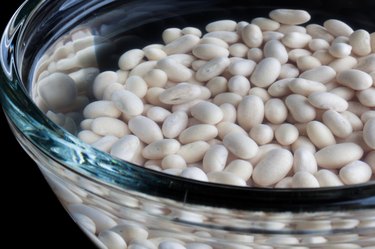
When phytic acid reaches your digestive tract, it interacts with bacteria and releases a substance called inositol. Inositol helps your liver process fats and has a role in muscle function. In spite of these benefits, phytic acid is called an antinutrient because it interferes with the absorption of minerals. Phytic acid is naturally found in beans, but you can easily lower the amount you consume by soaking or sprouting the beans.
Problem With Phytic Acid
Video of the Day
Phytic acid stores phosphorus until seeds need the mineral to support their growth. When you consume any food with phytic acid, including beans, it binds with iron, zinc, magnesium and calcium. As a result, your body can't absorb the minerals. Consuming phytic acid significantly reduces the body's absorption of iron, reports the Linus Pauling Institute. The amount of phytic acid in beans can also reduce protein digestibility by up to 10 percent, according to a report published in the August 2012 issue of the "British Journal of Nutrition."
Video of the Day
Soak the Beans
Soaking beans helps eliminate some of the phytic acid. To maximize the amount of phytic acid lost, soak beans for a minimum of 12 hours, suggests the Weston A. Price Foundation. Drain and rinse the beans several times during soaking to get rid of the phytic acid that has leached into the water. Do not use the soaking water for cooking. Phytic acid was reduced by about 60 percent when the soaking water was drained and fresh water was used for cooking, according to a study in the "Journal of Nutritional Science and Vitaminology" in April 2003.
Go With Sprouts
When beans sprout, an enzyme is activated that breaks down phytic acid and causes its levels to go down. Since beans are soaked prior to being sprouted, they also lose phytic acid in the water. Even though certain types of beans, such as mung beans, are more frequently used for sprouts, you can germinate any bean. When cowpeas, lentils and chickpeas were germinated, their phytic acid was reduced by 18 percent to 21 percent, according to research published in the September 2007 issue of "LWT -- Food Science and Technology."
Add Some Heat
Cooking also helps eliminate phytic acid in beans, but it has a smaller effect than sprouting and soaking. You can use heat to magnify the loss of phytic acid by cooking sprouts rather than eating them raw or by using the hot method of soaking beans. This method entails putting the beans in a large pot, adding plenty of water, bringing it to a boil and boiling it for several minutes. After that, take the pot off the heat and let the beans continue to soak for up to 24 hours.
- NYU Langone Medical Center: Inositol
- Linus Pauling Institute: Phosphorus
- British Journal of Nutrition: Impact of Antinutritional Factors in Food Proteins on the Digestibility of Protein and Bioavailability of Amino Acids and on Protein Quality
- Linus Pauling Institute: Iron
- Weston A. Price Foundation: Living With Phytic Acid
- Journal of Nutritional Science and Vitaminology: Effect of Soaking Prior to Cooking on the Levels of Phytate and Tannin of the Common Bean (Phaseolus Vulgaris, L.) and the Protein Value
- LWT -- Food Science and Technology: The Impact of Germination and Dehulling on Nutrients, Antinutrients, In Vitro Iron and Calcium Bioavailability and In Vitro Starch and Protein Digestibility of Some Legume Seeds
- The Bean Institute: Cooking With Dry Beans